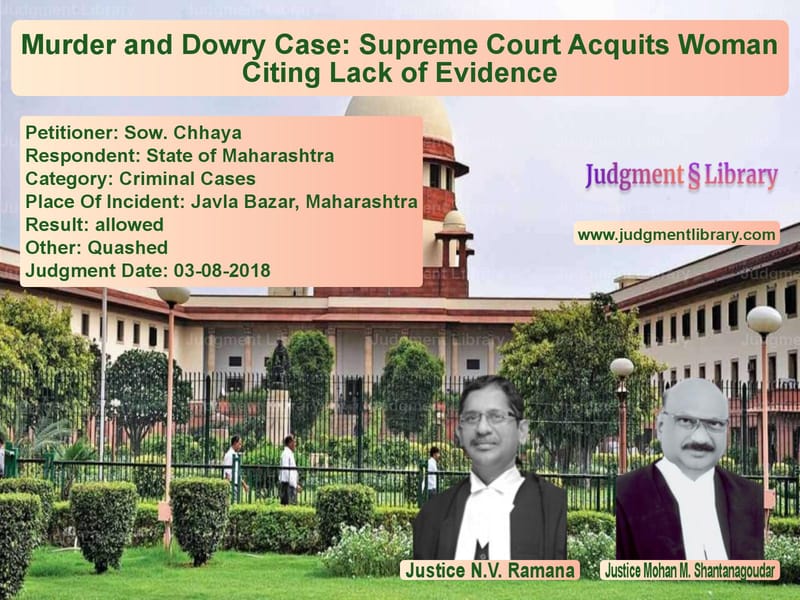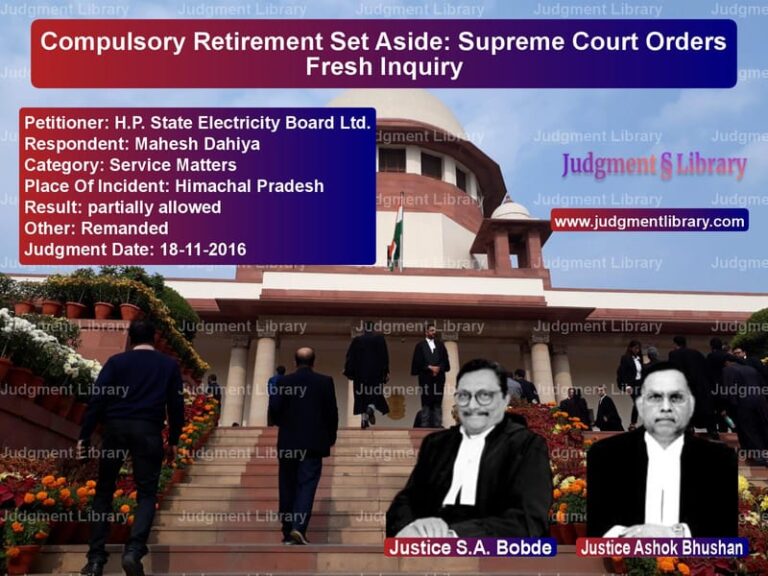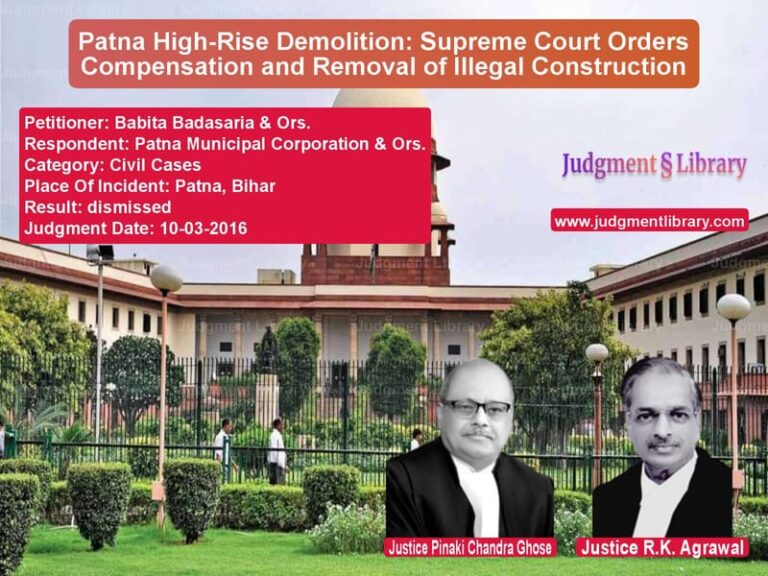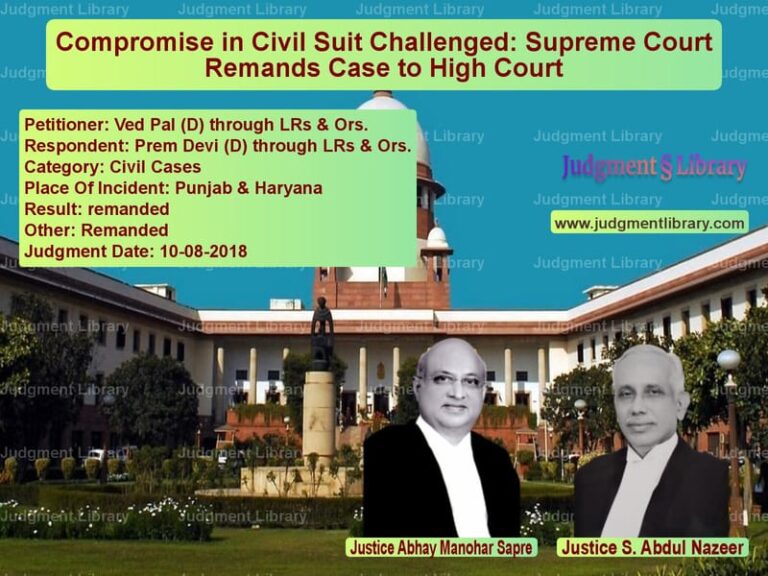Murder and Dowry Case: Supreme Court Acquits Woman Citing Lack of Evidence
The Supreme Court of India recently delivered a crucial judgment in the case of Sow. Chhaya v. State of Maharashtra, where a woman convicted of murder and dowry harassment was acquitted due to a lack of substantive evidence. The Court ruled that the conviction was based on weak evidence, including a dying declaration and uncorroborated allegations. This judgment reaffirms the principle that convictions must be based on clear and convincing evidence.
Background of the Case
The case revolved around the death of Kavita, a woman who sustained 100% burn injuries in her matrimonial home at village Javla Bazar, Tq. Basmath, on February 11, 2013. She was rushed to the Civil Hospital, Parbhani, where she succumbed to her injuries later that evening. Before passing away, Kavita gave a dying declaration implicating her husband and sister-in-law, Chhaya.
The trial court convicted both accused under Section 302 read with Section 34 and Section 498A read with Section 34 of the Indian Penal Code (IPC). The High Court upheld the conviction. However, Chhaya, the sister-in-law, challenged her conviction in the Supreme Court.
Key Legal Issues
- Whether Chhaya’s presence at the crime scene was established beyond a reasonable doubt.
- Whether the dying declaration was sufficient to convict her.
- Whether there was independent evidence supporting the allegations against her.
Arguments Presented
Appellant’s (Chhaya’s) Arguments
Chhaya’s defense primarily rested on her plea of alibi. Her counsel presented the following arguments:
- She underwent surgery on January 30, 2013, at the Rural Hospital in Partur and was on mandatory bed rest for more than 15 days.
- She was residing separately from the victim and her husband.
- Her name appeared in the dying declaration without any corroborating evidence.
- The allegations made by the victim’s parents were vague and did not establish specific acts of cruelty or dowry harassment.
State of Maharashtra’s Arguments
The prosecution contended that:
- The dying declaration was clear and consistent in implicating Chhaya.
- There was no reason for the deceased to falsely implicate her sister-in-law.
- The courts below had correctly relied on the dying declaration to convict her.
Supreme Court’s Observations
The Supreme Court, comprising Justices N.V. Ramana and Mohan M. Shantanagoudar, critically examined the evidence and concluded that the case against Chhaya was not strong enough to sustain her conviction.
On the Validity of the Alibi
“The appellant underwent surgery on 30.01.2013, and the medical certificate confirms that she was advised bed rest. There is no reason for us to ignore such medical evidence, particularly when the State has not disputed its authenticity.”
The Court held that the medical records, which were undisputed by the prosecution, provided a credible alibi.
On the Dying Declaration
“Though ample material was found against Accused No.1 (the husband), the only material against the appellant is that her name is also found in the dying declaration. In the absence of further corroborative evidence, the conviction cannot be sustained.”
The Court ruled that a dying declaration, though admissible, must be corroborated when the circumstances suggest the possibility of false implication.
On Independent Witness Testimony
“A perusal of the oral evidence of the parents of the deceased would indicate that only minor allegations are made against the appellant. Vague and cryptic allegations are found against her with no specific evidence of dowry demand or harassment.”
The Court emphasized that vague statements from family members are insufficient to establish guilt.
Final Judgment
The Supreme Court acquitted Chhaya by granting her the benefit of the doubt. It set aside the conviction and ordered her immediate release.
- Her plea of alibi was accepted based on undisputed medical records.
- The dying declaration alone was deemed insufficient to convict her.
- There was no independent evidence proving her role in the crime.
Implications of the Judgment
- Importance of Corroboration: The judgment reiterates that a dying declaration, while admissible, must be corroborated if there is a possibility of false implication.
- Strengthening Alibi Defense: The case highlights the significance of medical records in establishing an alibi.
- Protection Against Unfounded Convictions: The ruling safeguards individuals from being convicted based on weak or vague allegations.
Conclusion
The Supreme Court’s decision in Sow. Chhaya v. State of Maharashtra sets an important precedent in criminal law. It emphasizes the need for strong and independent evidence to convict an accused, ensuring that justice is not compromised by weak allegations. The ruling underscores the judiciary’s commitment to upholding fair trial principles and preventing wrongful convictions.
Petitioner Name: Sow. Chhaya.Respondent Name: State of Maharashtra.Judgment By: Justice N.V. Ramana, Justice Mohan M. Shantanagoudar.Place Of Incident: Javla Bazar, Maharashtra.Judgment Date: 03-08-2018.
Don’t miss out on the full details! Download the complete judgment in PDF format below and gain valuable insights instantly!
Download Judgment: Sow. Chhaya vs State of Maharashtra Supreme Court of India Judgment Dated 03-08-2018.pdf
Direct Downlaod Judgment: Direct downlaod this Judgment
See all petitions in Murder Cases
See all petitions in Dowry Cases
See all petitions in Bail and Anticipatory Bail
See all petitions in Judgment by N.V. Ramana
See all petitions in Judgment by Mohan M. Shantanagoudar
See all petitions in allowed
See all petitions in Quashed
See all petitions in supreme court of India judgments August 2018
See all petitions in 2018 judgments
See all posts in Criminal Cases Category
See all allowed petitions in Criminal Cases Category
See all Dismissed petitions in Criminal Cases Category
See all partially allowed petitions in Criminal Cases Category







